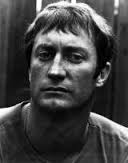
LOVE LETTERS FROM TERALBA ROAD
Australia, 1977, 52 minutes, Colour.
Bryan Brown, Gia Carides, Kris McQuade?.
Directed by Stephen Wallace.
Love Letters From Teralba Road has been hailed as one of the best short films made in Australia in the '70s. Based on some letters discovered and dramatised, the film has a lot to portray about urban life in Australia. love, marriage and broken relationships. The two central characters are played by Bryan and Kris McQuade?. They bring strength, dignity and pathos to the roles of a man and woman who could relate well but are unable to. Authentic Sydney and Newcastle locations are very well used. The film communicates directly with its audience rapidly and effectively. Direction is by Stephen Wallace who made a number of short films in the '70s. Another was the surrealistic fantasy called Conman Harry And The Others, also starring Bryan Brown. It showed a group of people in Sydney coming together and joining in a ritualistic (if overlong) dance of celebration and life. Wallace's first feature film (also with Brown) was the excellent prison drama, Stir.
1. The impact of this short film? Its asking the audience to supply the solution?
2. The significance of the title in real term,, the pathos., the pathetic note in Len's letters? Symbol? The device for revealing the characters? Their feelings?
3. The structure of the film: the prologue and the setting of the tone for an emotional response from the audience. the varying episodes, the focus on Len's visit on the Saturday and Barbara's decision about going back to him?
4. Colour photography, atmosphere of realism,, the environment of Len and Barbara, the emphasis on close-ups? Comment on the use of the voice-over for the contents of the letters?
5. An atmosphere of realism as regards the setting, the nature of the episodes?
6. Audience identification with Len and Barbara? Observing the clash at the beginning, observing the two of them and wondering about their marriage,, about the future? With whom could the audience become involved? Although the characters were very specifically of a certain class and financial status. how was the observation of human nature universal?
7. The build-up of the prologue, the violence and the ugliness and the alienation of sympathy from Len?
8. Barbara and her ordinariness at home, as a recipient of the violence? Enough motivation for her to leave? After two years - her way of life, the friend with whom she talked at the hotel? Her eyeing of the men and the eyeing of her in the hotel to indicate the possibility of infidelity? Her reaction to Len. loving him, the reaction to his letters and her puzzle? An ordinary kind of girl,, living with her father and the hostility towards her absent mother? The bond with Maureen? Seeing her in ordinary home situations? The important decision about her life and her capacity to make it?
9. The picture of Barbara e.g. with the scene with Maureen and her make-up, her going out and her coming home singing and lying on the bed, waiting for Len at the station, playing the games with him on the way home, in love with him but forbidding him to touch her, her reaction to her father coming home drunk and getting Maureen out of the way, serving breakfast, playing in the garden with Maureen? The cumulative effect of these episodes? How much was revealed of Barbara by the way she talked, her wondering about the future especially in conversations with Maureen, her father, her friend at the hotel?
10. What kind of man was Len? The nature of his anger and impatience? Seeing him at work, his sullenness? His preoccupation about his teeth? His relationship with his mother? The way that he handled the transfer with the abrupt manner? The way the management treated him?
11. The build-up to the trip, the arrival, the reaction to seeing Barbara again and the ordinary language, the games on the way home, his wanting to make love and Barbara's reaction? The importance of Maureen coming in and tidying him up? The father coming in, breakfast, the final sequence in the garden and talking about the future? The significance of his having the rifle and aiming it out of the window?
12. The character of Maureen, as Barbara's sister, relationship with the father, the make-up scene, bringing him the pillow, playing with the hose in the garden , her reaction to her father's drunkenness, breakfast? The effectiveness of the character sketch?
13. Len's mother and her talk, attitude towards Barbara and Maureen, not wanting her son to go? How much hold did she have over him? Barbara's father and the absent mother, the beer, the cabbages, breakfast? Patterns for the younger generation?
14. The sketching of minor characters e.g. the people in the hotel?
15. The film as a portrait of people and their capacities and limitations, hopes and choices, environment?
16. Insight into marriage, love, the bonds between man and woman, compatibility, self-giving, selfishness, life as lived in ordinary sequences and not melodramatic ones? How much authentic insight?